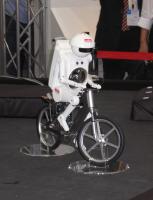That was the question asked by Curzon when he emailed us this article from the Asahi English edition.
Ritsumeikan Primary School, a new facility scheduled to be opened in Kyoto’s Kita Ward next spring, promises to offer a student commuting-route tracking system.
The system uses integrated circuit (IC) cards to register students as they pass certain checkpoints.
The smart card technology will not only register arrival at and departure from school, it will also issue e-mail messages to parents within 10 seconds of a child passing through the ticket gate at their train station.
It’s like what’s wrong with politics. Everything has to be one side or another. Let’s all just hold hands and agree: it’s helpful and creepy.
By the way, I would like to point out that Doshisha, Ritsumeikan’s rival, is also implementing a similar system, but their’s uses GPS. More helpful or creepier?
At least there’s one unequivacebly good piece of news in the article.
The PiTaPa card is a travel smart card promoted by the Surutto Kansai Association, a group of 43 private rail and subway companies and municipal transportation bureaus in the Kansai region.
Finally a unified payment system for Japanese public transportation! May it spread throughout the land, be fruitful and multiply!






